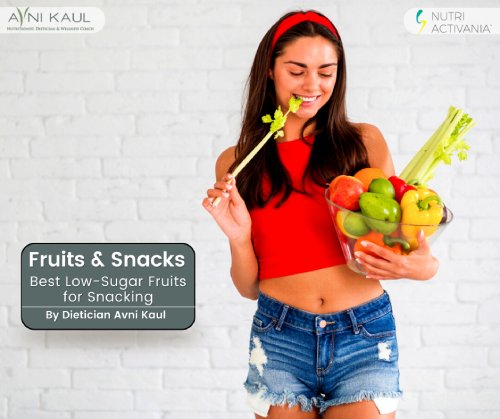It is news to no one that eating fruit is good for your health. Having said, if you are concerned with your sugar consumption—be it due to diabetes or some other reason—not every fruit is created equal. For this reason, top dietician Avni Kaul shares some top choices for low-sugar fruits that will not spike your blood glucose levels.
Prior to you start snacking on fruits, though, the dietician Avni says there are a couple of other things to remember—namely that when it comes to your blood sugar levels, it is always best to go for the whole fruit instead of simply drinking its juice, and that even low-sugar fruits could impact glucose levels when consumed as “naked carbohydrates” (i.e., all by their lonesome), which is the reason you would be wise to pair fruit with a protein or healthy fat whenever possible.
How much sugar one should aim for daily?
When it comes to opting for low-sugar foods, a little context in the form of recommended daily intake (RDI) could be very helpful. So how much sugar are you actually supposed to be having anyway? Well, the answer is a bit more complicated than you feel—namely because the sole hard and fast recommendations you will find associated with added sugars, which are far worse for your health compared to the nutritionally beneficial, natural sugars found in whole, raw fruits.
According to the 2015-2020 Dietary Guidelines for Americans, no more than 10% of your daily caloric consumption should come from added sugars (so, 200 calories or 50 grams of sugar each day on a 2,000-calorie per day diet).
As earlier mentioned, the natural sugars present in fruit are quite different stories, and there are no upper limits on their consumption—namely since they are mostly good sources of dietary fibre and nutrients, and are processed by our body quite differently than added sugars.
As such, look to eat natural sugars in place of added sugars whenever you can and know that you need not worry about eating fruit because, though it is technically possible to get excessive of a good thing, you would have to try really hard to achieve a problematic level of sugar consumption from fruit alone.
The conclusion? Steer clear of added sugar, but do not sweat the natural stuff found in fruits and vegetables. And if you have diabetes, bear in mind that the most important thing is to monitor your blood glucose levels according to your doctor’s or dietician’s instructions, because those can be impacted by a variety of foods (including fruit) and they are a very big deal for your health.
Avni Kaul who is one of the leading dieticians in Delhi for diabetes shares the best low-sugar fruits that you may have.
Strawberries
Besides being an excellent low-sugar choice, strawberries can increase good cholesterol and reduce blood pressure, and simply one cup of whole fruit provides your recommended daily dose of Vitamin C. Sugar content is 7 grams/cup.
Grapefruit
Grapefruits are well-known for being tart, so it must be no surprise that one-half of this (quite large) fruit has roughly 11 grams of sugar. Best of all, grapefruit could help keep insulin levels even, thus reducing the risk of type 2 diabetes. The sugar content is 10.6 grams per half fruit.
Avocado
Avocados are quite close to sugar-free as a fruit can be (and yes, they are technically fruits). A complete avocado has just 1 gram of sugar, along with the added benefit of being filled with healthy fats. The sugar content is 1 gram of each avocado.
Kiwis
Technically considered a berry, one kiwi—which is simple to find all year—has merely about 7 grams of sugar. This fruit is also a top source of Vitamin E, which helps protect your skin from sun damage. The sugar content is 6.7 grams per kiwi.
Plums
With just 30 calories and around 7 grams of sugar, plums are an excellent low-sugar fruit to add to salads and desserts for a little sweetness. Plums are also high in fiber, which helps slow down a blood sugar spike posts you eat carbohydrates. The sugar content is 6.6 grams per fruit.
- Amazing Indian Foods to Lower Your Blood Pressure Level Naturally - April 26, 2024
- Fruits That Can Help You Lose (or Maintain Your) Weight - April 23, 2024
- What are the Potential Health Benefits of Raw Sprouts? - April 20, 2024


